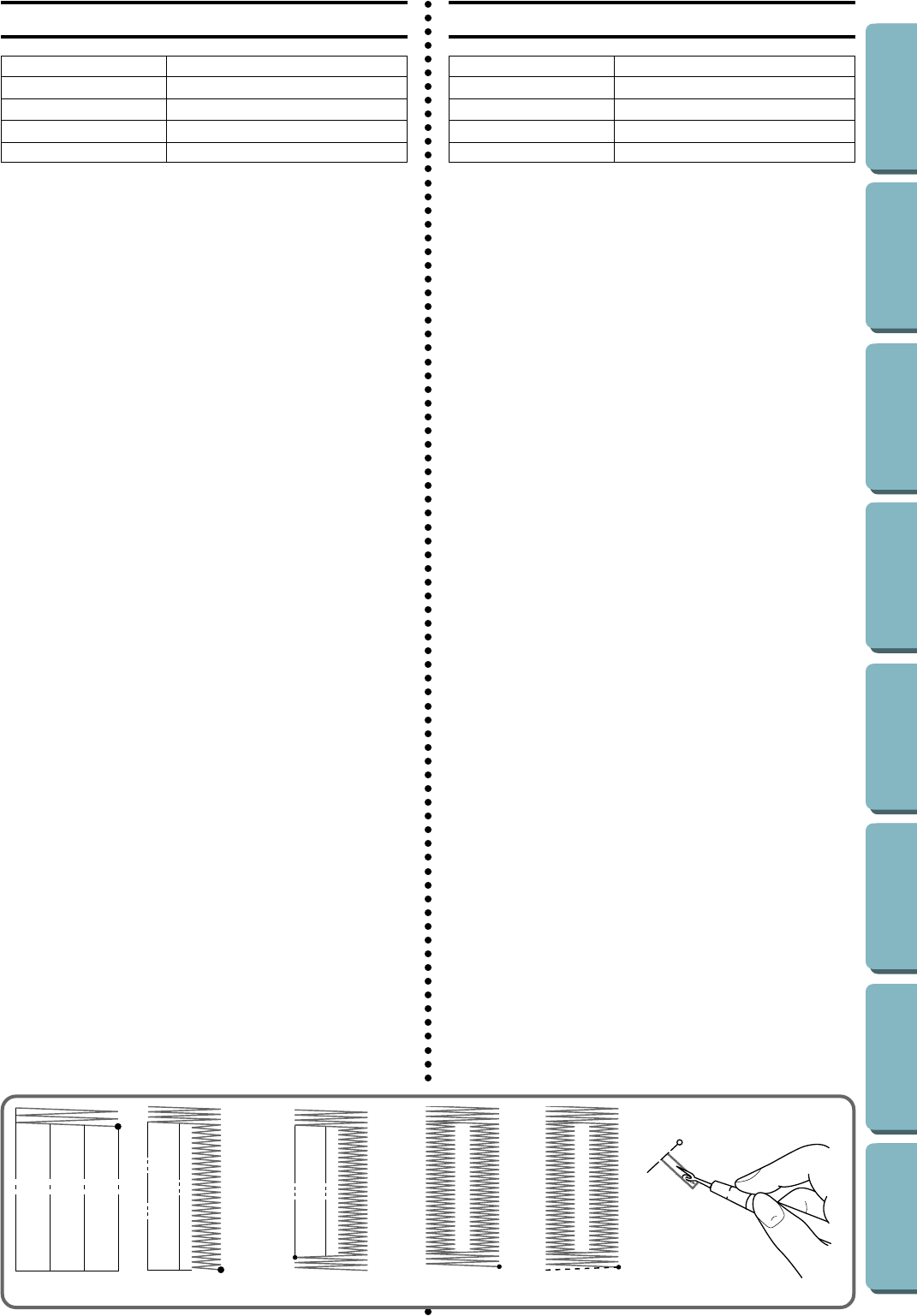
36
CONTENTS
KNOWING YOUR
SEWING MACHINE
STRAIGHT AND ZIGZAG
STITCHING
BUILT-IN STITCHES
USING ATTACHMENTS
AND APPLICATIONS
BUTTONHOLE
AND
BUTTON SEWING
MAINTENANCE
INDEX
Buttonhole Sewing
STITCH LENGTH Set between 0 and 1 (F) for the Satin Stitch.
STITCH WIDTH See the instructions below.
NEEDLE POSITION R (right position)
PRESSER FOOT Zigzag
NEEDLE Single
Making a buttonhole
NOTE:
1. It is recommended to practice making a buttonhole on a scrap piece of
fabric before attempting it on your project.
2. Using tailor’s chalk to mark the position and length of the buttonhole on
the fabric is also recommended.
Step A: Bar Tack
1. Set the stitch length between 0 and 1 (F), stitch width to 5 and the needle
position to R.
2. Lower the presser foot over the top right corner of the buttonhole mark and
sew 3-6 stitches.
3. Stop the machine when the needle is in the fabric on the right side of the
stitch (position A). (Turn the balance wheel counterclockwise if neces-
sary.)
Step B: Right Row
1. Set the stitch width to 2.
2. Sew the predetermined length of the buttonhole to the other end.
3. Stop the machine when the needle is in the fabric on the right side of the
stitch (position B). (Turn the balance wheel counterclockwise if necessary.)
Step C: Final Bar Tack
1. Set the stitch width to 5.
2. Sew 3-6 stitches.
3. Stop the machine when the needle is in the fabric on the left side of the
stitch (position C). (Turn the balance wheel conterclockwise if necessary.)
Step D: Left Row
1. Lift the presser foot.
2. Turn the fabric 180 degrees using the needle as an axis and set the stitch
width to 0. This will move the fabric slightly. Lower the presser foot.
3. Turn the balance wheel toward you (counterclockwise) to sew one stitch.
This moves the needle from the left to the right.
4. Set the stitch width to 2.
5. Sew until the needle reaches the other bar tack. Stop the machine with the
needle in the fabric on the right of the stitches (position D).
Securing the stitching and cutting the buttonhole
1. To secure the stitching, turn the fabric 90 degrees counterclockwise,
set the stitch width to 0, the stitch length to 1 and sew 5-6 Straight
Stitches as shown in fig. E.
2. Remove the fabric from the machine.
3. It is recommended that pins be placed across both bartack ends of
the buttonhole as protection against cutting the stitches.
4. Cut an opening in the middle of the buttonhole with a seam ripper
tool. Be careful not to cut through any stitches.
Coudre une boutonnière
Longueur de point
Réglée entre 0 et 1 (F) pour le point bourdon.
Largeur de point Voir les instructions ci-dessous.
Position de l’aiguille R (à droite)
Pied-de-biche Zigzag
Aiguille Simple
Faire une boutonnière
REMARQUE :
1. Il est conseillé de s’entraîner au préalable sur une chute de tissu
avant d’essayer de coudre la boutonnière sur le tissu souhaité.
2. Il est également conseillé de marquer sur le tissu la position et la
longueur de la boutonnière à l’aide d’une craie de tailleur.
Etape A : Barres d’arrêt
1. Régler la longueur de point entre 0 et 1 (F), la largeur de point sur
5 et la position de l’aiguille sur R.
2. Abaisser le pied-de-biche sur le coin en haut et à droite de la bou-
tonnière et faire 3-6 points.
3. Arrêter la machine lorsque l’aiguille se trouve dans le tissu et à
droite du point (emplacement A) (Tourner le volant à main dans le
sens contraire des aiguilles d’une montre si nécessaire).
Etape B: côté droit
1. Régler la largeur de point sur 2.
2.
Coudre la longueur préalablement choisie de la boutonnière jusqu’au bout.
3. Arrêter la machine lorsque l’aiguille se trouve dans le tissu et à
droite du point (emplacement B). (Tourner le volant à main dans le
sens contraire des aiguilles d’une montre si nécessaire).
Etape C: dernière barre d’arrêt
1. Régler la largeur de point sur 5.
2. Faire 3-6 points.
3. Arrêter la machine lorsque l’aiguille se trouve dans le tissu et à
gauche du point (emplacement C). (Tourner le volant à main dans
le sens contraire des aiguilles d’une montre si nécessaire).
Etape D: côté gauche
1. Relever le pied-de-biche.
2.
Faire pivoter le tissu de 180 degrés autour de l’aiguille et régler la largeur
de point sur 0. Le tissu bougera légèrement. Abaisser le pied-de-biche.
3. Tourner le volant vers soi (dans le sens contraire des aiguilles d’une
montre). L’aiguille se déplacera de gauche à droite.
4. Régler la largeur de point sur 2.
5. Coudre jusqu’à ce que l’aiguille atteigne l’autre barre d’arrêt. Arrê-
ter la machine; l’aiguille doit se trouver dans le tissu à droite des
points (emplacement D).
Consolider les points et couper la boutonnière
1.
Pour consolider les points, faire pivoter le tissu de 90 degrés dans le sens
contraire des aiguilles d’une montre, régler la largeur de point sur 0, la
longueur de pointe sur 1 et faire 5-6 points droits comme l’indique la fig. E.
2. Retirer le tissu de la machine.
3. Il est conseillé de placer des épingles à travers la fin des barres
d’arrêt de la boutonnière pour éviter de couper les points.
4. Faire une ouverture au milieu de la boutonnière à l’aide d’un dé-
coud-vite. Veiller à ne pas couper les points.
A
B
C
D
(E)


















